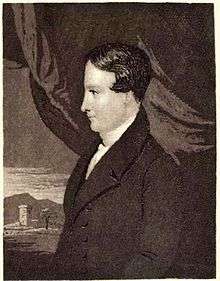Robert Murray M'Cheyne
| Robert Murray McCheyne | |
|---|---|
 Presbyterian minister and missionary | |
| Born |
21 May 1813 Edinburgh, Scotland |
| Died |
25 March 1843 (aged 29) Dundee, Scotland |
Robert Murray M'Cheyne (pronounced "Mak-shayn",[1] occasionally spelled as "McCheyne"; 21 May 1813 – 25 March 1843) was a minister in the Church of Scotland from 1835 to 1843.
Life
He was born at 14 Dublin Street in Edinburgh on 21 May 1813, the son of Adam McCheyne W.S. (d.1854).[2]
He was educated at the University of Edinburgh and at the Divinity Hall of his native city, where he was taught by Thomas Chalmers. He first served as an assistant to John Bonar in the parish of Larbert and Dunipace, near Falkirk, from 1835 to 1838. After this he served as minister of St. Peter's Church (in Dundee) until his early death at the age of 29 during an epidemic of typhus.
Not long after his death, his friend Andrew Alexander Bonar edited his biography which was published with some of his manuscripts as The Memoir and Remains of the Rev. Robert Murray M'Cheyne. The book went into many editions. It has had a lasting influence on Evangelical Christianity worldwide.
In 1839, M'Cheyne and Bonar, together with two older ministers, Dr. Alexander Black and Dr. Alexander Keith, were sent to Palestine on a mission of inquiry to the condition of the Jews. Upon their return, their official report for the Board of Mission of the Church of Scotland was published as Narrative of a Visit to the Holy Land and Mission of Inquiry to the Jews.[3] This led subsequently to the establishment of missions to the Jews by the Church of Scotland and by the Free Church of Scotland. During M'Cheyne's absence, his place was filled by the appointment of William Chalmers Burns to preach at St. Peter's as his assistant.
M'Cheyne was a preacher, a pastor, a poet, and wrote many letters. He was also a man of deep piety and a man of prayer.
M'Cheyne died exactly two months before the Disruption of 1843. This being so, his name was subsequently held in high honour by all the various branches of Scottish Presbyterianism, though he himself held a strong opinion against the Erastianism which led to the Disruption. Bonar records, "And when, on 7 March of the following year (i.e. 1843), the cause of the Church was finally to be pleaded at the bar of the House of Commons, I find him writing: 'Eventful night this in the British Parliament! Once more King Jesus stands at an earthly tribunal, and they know Him not!'" —Memoir (1892), p. 147).
M'Cheyne designed a widely used system for reading through the Bible in one year. The plan entails reading the New Testament and the Psalms through twice a year, and the Old Testament through once. This program was included (in a slightly modified form) in For the Love of God by D. A. Carson (ISBN 0-85111589-6) and is recommended by several Bible publishers, such as the English Standard Version and the New English Translation.[4]
He died of typhus in Dundee following a short illness on 25 March 1843. His parents agreed to the wish of his congregation that McCheyne be buried in the graveyard beside St Peter's Church in Dundee, rather than in the family's own burial-ground in Edinburgh. He was buried on Thursday 30 March, with an estimated 7000 people attending the funeral.
Family
He never married, but he did have a fiancée at the time of his death, Jessie Thain.
Works
- Mission of Discovery Christian Focus Publications, ISBN 978-1-85792-258-5
- The Glory of the Christian Dispensation (1845)
References
- ↑ Miller, G M (1971). BBC Pronouncing Dictionary of British Names. London: Oxford University Press.
- ↑ Rogers, Charles (1871), Monuments and monumental inscriptions in Scotland, The Grampian Society.
- ↑ Bonar, Andrew Alexander; M'Cheyne, Robert Murray (1849). Narrative of a Mission of Inquiry to the Jews from the Church of Scotland in 1839. Edinburgh: Whyte. p. 361.
- ↑ "Matthew 1", NET Bible (Online ed.), Bible.org, retrieved 2014-03-02
Further reading
- Awakening – The Life and Ministry of Robert Murray McCheyne by David Robertson, Christian Focus Publications, ISBN 978-1-84550-542-4
 Millar, Alexander Hastie (1893). "McCheyne, Robert Murray". In Lee, Sidney. Dictionary of National Biography. 36. London: Smith, Elder & Co.
Millar, Alexander Hastie (1893). "McCheyne, Robert Murray". In Lee, Sidney. Dictionary of National Biography. 36. London: Smith, Elder & Co. - Smellie, Alexander, Robert Murray McCheyne, London: National Council of Evangelical Free Churches, 1913.
External links
| Wikiquote has quotations related to: Robert Murray M'Cheyne |
- Robert Murray M'Cheyne Resources – Website of online resources
- The Biography of Robert Murray M'Cheyne by Andrew A. Bonar' at Project Gutenberg
- Robert Murray M'Cheyne: The Shining Light of Scotland by David Estrada, pages 28–37 in Christianity & Society, volume 14, no. 4, October 2004
- St Peter's Website
- McCheyne, McGonagall and the West End of Dundee – a lecture by David Andrew Robertson on 2010-06-21 as part of Dundee's WestFest celebrations.
- The Works of Rev. Robert Murray McCheyne: Writings and Lectures
- The Works of Rev. Robert Murray McCheyne: Sermons
- Narrative of a Mission of Inquiry to the Jews from the Church of Scotland in 1839